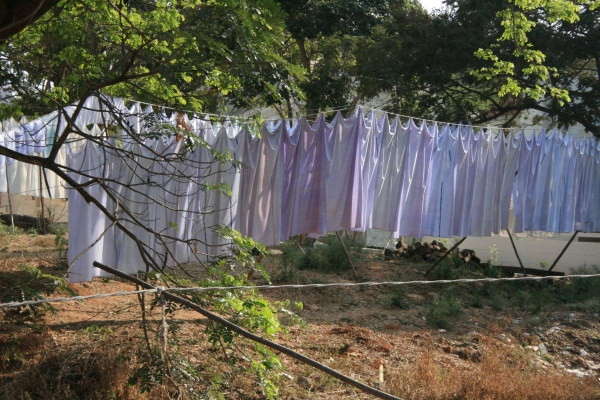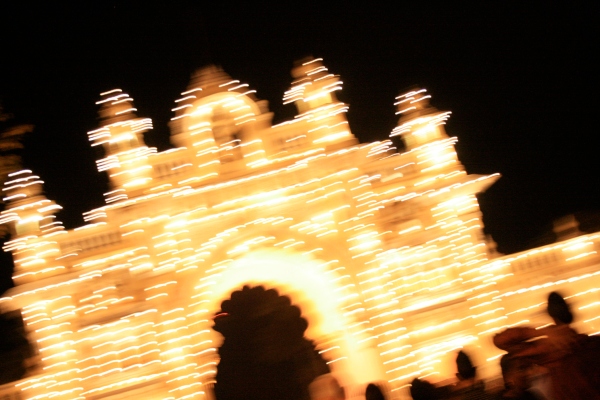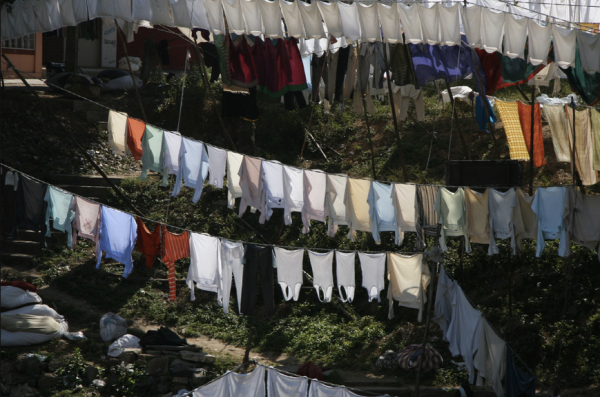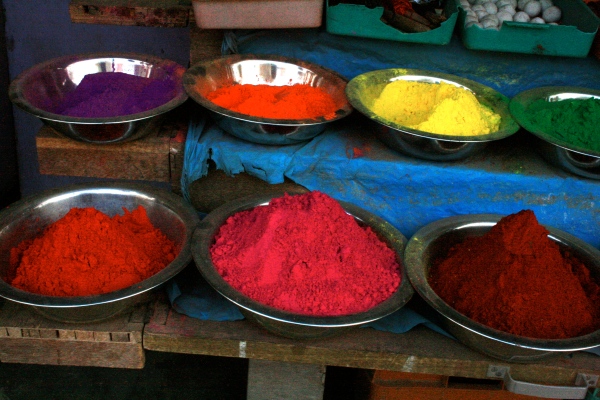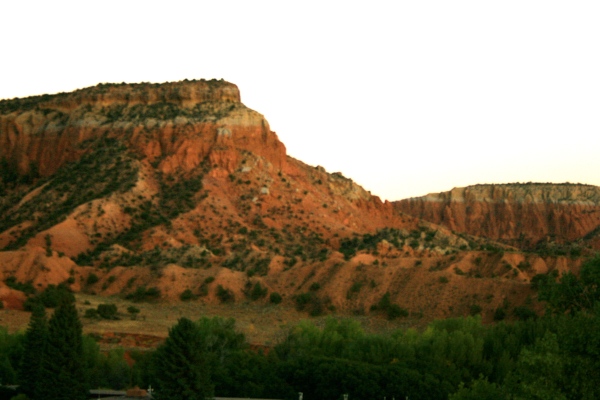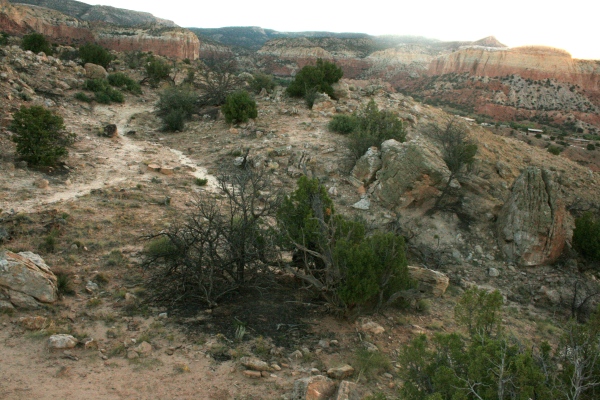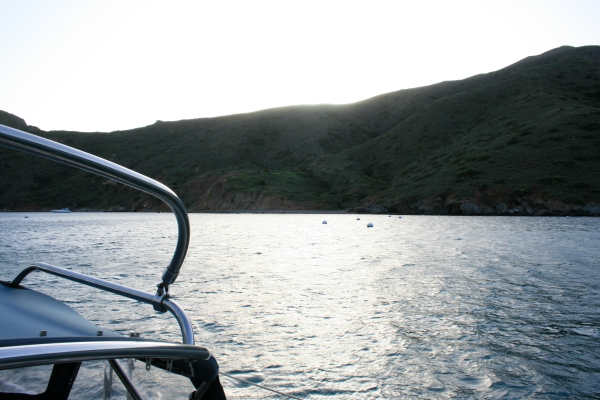see
Yes, it’s the sea.
With its birdsong scattered like starlight
and those breezes– you know those breezes that
carry the sound of foghorns and halyards
from far away.
It’s the sea that holds it all together,
even when the winds pick up and
whip seagull cries around your ears and wide eyes
and with your face turned to the wind you catch
brief glimpse of memory like
the back of a hideous sea snake that you thought you’d escaped.
And we’d both stand on the shore and stare
as if intent alone could give us wings
or stop the restless fluttering that drove us forward.
That flutter of fear that drives people away.
Treacherous territory,
to be in two places at once. Both
on my stoop, and on a shoreline
where each one of those
damned bird cries makes the
smell of seaweed and
salt water
fill my head.
And then he’s there, with big arms.
And I’m above it all
watching my little red boat get
smashed by the waves.
That night I dreamed that I was standing on the beach looking for my little red boat
when an army of crabs surrounded me and this time there was nobody there.
Death, it seems, stalks even the young.
Even death by crab. Which is a painful way to go I’ve heard.
There were so many nights like that
dreams of waves and dreams of being swallowed,
nights of being woken up and
those strong arms lifting me out
through the window
and then we’d lie on the deck
with our life jackets on,
looking up at the star light.
But there were also those nights where my tears would drop
faster than I could cry them
like the sea itself was
demanding her payment for being made of so much water
That’s what you get, it said,
should have gone with the sky, it said,
then your days would be filled with dreams and your eyes would be light like the sun.
And I’ll slip off the deck
into the blackness and float.
Cold, salty unknown.
Your tears taste like blood;
my currents run with salt water.
windvsroots
On drishti:
When the man next to me flops onto my mat in parshva danurasana breathing like a cat being dunked repeatedly into a bucket of ice cold water, it’s hard to remain caught up in the raptures of internal happenings. But I guess that’s what practicing in a room full of people is all about– it’s easy to focus when it’s just me. But dying cat-man is a benevolent task-master, driving me to deeper levels of concentration. God bless you, dude.
On asanaholes:
Man at the coconut stand asks me what pose is my last post. Owlie-o suggests I say utplutih.
Which makes me think…
On savasana:
It occurs to me that maybe the reason we finish as a corpse is to remind us that we are in fact mortal, and that death is coming, along with everything else.
*+*+*+*+*+*+*+*+*+*+*+*+*+*+*+*+*+*+*+*+*+*+*+*
The first thing I do when I wake up is throw open the windows. If I sleep with them open then the mozzies get me, and then I have ankles that are swollen for a month and scarred for years (if somebody knows what mineral deficiency causes such horrible scarring from a stupid bug bite then please let me know). Around 430 the monks start singing, and the sound of the HOMMMMMMMMMMMM comes in through my little window, bouncing around my room. It’s all I can do to try and contain the rapture that this causes, watching the air vibrate with these colours (purple blue and turquoise) that are actually sounds. Then at 530 the mosque starts the morning prayers, and in the other window comes the warbling and chanting (yellow and red) and these sounds meet in the middle of my room and crash into each other and it’s a little too much for me at this point. I just kind of lie there letting my body go “ohhhmyyygooddddd”. And then after an hour or so the monks stop, and then it’s just the mosque. And then that stops and it’s just the silence, a fat and succulent silence. And then I take a bucket bath, and then Pushpa brings me my coffee, and then I sit down to write for a bit before going to practice.
I climbed Chamundi hill the other day, and there’s a temple at the top. I felt like a western woman in a movie about a western woman who goes to India. I went into the temple, took my shoes off, put my hands in the fire and wiped the fire all over my face, and then walked outside and, in true western-woman-goes-to-India fashion, looked up at the sun and smiled while a cool breeze tickled my hair. A group of Indian men approached and asked if they could take a picture with me and I was feeling so compassionate after my spiritual experience in the temple that I said yes. Profoundly changed for the better, I smiled at every single person on the walk down the hill.
Ok that’s not actually what happened. I took my shoes off and put them in my bag. The guy next to me did the same, and he was told off for taking his shoes into the temple. So I zipped my bag shut, pulled it tight next to my body, and walked in. They’re more like slippers anyway. I had to elbow my way through a group of people to stick my hands in the damn fire, and then my hands smelled like gas. The whole area smelled like urine. There were monkeys and lots of people asking for money, and lots of people asking to take photos with me, I cannot imagine why. I said yes to a girl, and all of a sudden she and all her friends are standing around me with their arms around me and I’m going to end up on somebody’s facebook page somewhere.
And then I went for a walk, and I stood on top of this hill, looking out over city. City for miles. And I thought about one of the last times I was standing on top of a hill– a couple of weeks before I left and I drove out to the Palisades to check out what was growing on the Temescal loop (and hang out in skull rock for a bit because I like that craggy old rock), and realised that I’d forgotten to take any shoes to hike in. So I just set out barefoot, since it didn’t matter. And I hadn’t done that loop in a while. Sometimes I like to take my time and stop to take pictures of things and ooh and ahh and revel in the wonders of the natural world. And sometimes I like to make every muscle in my body burn, and feel my lungs suck in the air, and the sweat pour. And it was one of those days. A man doing his daily work out commented on my lack of shoes, and I replied that I’d just forgotten my own ones. He told me that I must be very brave and I replied that I hear that a lot and then I ran. I ran up the hill. I ran so hard that I thought my legs might come off and the only thing that would keep my body going would be pure momentum. About halfway up the clouds started going really dark, and within ten minutes those big ploppy raindrops were coming down.
I stood there on top of this hill, looking out over the ocean to Catalina Island. Behind me the view stretched past downtown LA to the San Bernadino mountains (well the peaks anyway) and it occurred to me that nowhere else in the world is as beautiful as this. A city nestled in the mountains, with 4,000,000 acres of hike-able wilderness, and the primal ocean, and the craggy mountains, and the snow in the distance. And at that moment I realised that I DO like LA. In fact I love it. I love that I can stand there, barefoot, on top of a mountain, and not freeze, with the wind whipping my hair around my face, and the rain soaking my clothes, and I was the only person for miles (weak-o shoe man must have turned around). In front of me, the sea. Behind me, the mountains. All around, the wind. Yes. I am happy in Los Angeles.
The top of Chamundi hill is not like the top of a hill in Will Rogers state park. Not even close. It’s stinky and crowded, it’s too hot and there’s no breeze and all of the light glittering off the MILLIONS of windows that stretch into eternity look, at first, like looking out onto the ocean. But then I realise that it’s an ocean of houses and shanty towns and smog and traffic and mosques and monks and cows and goats. Not the sea at all. The sobering thought that I’m so far inland makes me feel a bit claustrophobic, and I have to remind myself that the wind is there, and that space is there, it’s just manifesting in a different form, that’s all.
Even still, I am not ready to leave this place, with its noises and its smells and its colours. All of the stuff I talked about before, with its yang-ness and it’s free-ness and it’s wind blowing in your hair on the back of a scooter-ness makes me feel quite manic. That freedom feeling that you only get when you’re moving really fast. Like when I drive up PCH towards Big Sur as fast as my fancy car can take me, trying to make that German suspension lose traction (I heart tiptronic), and the windows are down and the music is playing and it feels for a few hours like I have no context except the present. It’s not true of course. The context exists until I erase it. Sometimes I just wish there was a faster route than the excruciating torture I put myself through. So that’s it. I’m trying to replace the difficult path with a path of pretending it doesn’t exist. I can do better than that, I know it. But sometimes it’s nice to just pretend for a minute.
My sore. In which Rebecca indulges in a lengthy reflection of all she has observed (minus a few unimportant details) over the course of the last week.
“After enlightenment, the laundry.”
On my first day here, I ran to catch up with Louise and Meghan, as I’d lagged behind to stare at a tree. “Why are you running?” Louise asked. “To catch up!” I replied. She smiled. “Running is not there in India.”
Life here isn’t luxurious by any western standard. We wash squatting on the floor, pouring water over ourselves from a bucket. The solar panels started working a few days ago, so we now have hot water. Laundry is done by hand, outside on the washing stone, which has a tap in the wall next to it (and I feel lucky to have a tap). A ten minute walk is walked, in the hot sun. A five minute wait is half an hour, in the sticky heat. Sunlight reflects off the road ahead (“If there were water, and no rock”). Poverty and riches stand in stark contrast to each other and, well, I’m sure this is nothing you’ve never heard or seen before– I think it’s one of the most cliched observations about India in general– and yet, seeing a man crouching outside his little hut, or walking to pump water from the water pump down the road, does not cause pity. Not like, say, an Oxfam commercial, with those big brown eyes (fly crawling across face), and those skinny little limbs (distended sick belly). No, I think that pity is a response to self-pity. And the general cultural consensus here seems to be more about getting on with it than about sitting in reflection of all that everyone else seems to have. Not like in Glasgow where the general consensus is usually “Hmph. Alright for some.”
Which isn’t to say that it’s okay. And which isn’t to say that I’m not kinda dude-ranchin it up here. A few weeks of washing from a bucket is quaint. A few months would be an experience. A few years and I’d start watching Beverly Hills 90210 to get a taste of something else.
There’s this innocence. Like when Pushpa tells me that almonds are too expensive here, and says that 500 grams of almonds would cost 40 rupees (which IS very expensive for here), and I don’t have the heart to say that 500 grams of almonds in California would probably cost 400 rupees. Or Guru, the rickshaw driver, who picks us up and drops us off in Hebbalu for a few hours so that we can wander around. Guru’s dad died last year, so he’s supporting his mother and wee brother on his rickshaw driver’s salary. It’s crap money, lots of stress, lots of exhaust fumes. He taught himself English a few years ago, and is teaching himself Tanzanian now because he has a few Tanzanian clients. He speaks five languages, all self taught, except Kannada, which is his native tongue. He dreams of doing something else, but he’s the best rickshaw driver there is, and doing something else (like being a taxi driver) takes money (for a car), which he doesn’t have.
We get back after a few hours of walking around, and he’s standing by his rickshaw, polishing his country coins. Little boys in India will run up to you and say “country coin?” and then you give them a country coin and they ask you how much it’s worth and this is almost exciting as having their picture taken and seeing it on the little screen on the back of the camera. But Guru is a grown man with a country coin collection. He has old British coins. Old Indian coins. Tanzanian coins and French coins from before the Euro existed. He sees us and stops to show us each of his favourites, and squeezes each one in his hand before putting it away in his special bag. It’s getting dark, and he reaches up and, with a proud grin, flicks on a fancy decorative light he’s installed in the roof of the rickshaw. We’re all cast with a strange greenish glow, that gives way to pink, then blue, then purple, then yellow.
The next day he picked us up to take us to a craft fair. We were taking too long chatting to all the different artists, so he wanders in to catch up with us, and helps me bargain for a cool statue of Ganesha. He asks me where I’m from, and I explain that I grew up in Scotland, and now live in Los Angeles, and his eyes light up. “I would love more than anything to go to Los Angeles. It is my life’s dream.” and I tell him to come and visit– that he can stay in our guest bedroom and that I can drive him around for a change. I was serious. He smiled and said that he will probably never be able to afford the ticket. He turns to me and says “I do not want to die in India.” I suggest Iran. He laughs and says “no, not Iran. Not Iran, not Pakistan, not Afghanistan and not India.”
I remember having an argument with a man I went to school with. His [sanctimonious] opinion was that the only way to see the world was with a backpack on. We actually had quite a heated discussion about the whole thing because at one point he said that he didn’t think he could be friends with or talk to somebody who wasn’t willing to backpack (I thought to myself that I didn’t necessarily want to be friends with somebody who is convinced he is morally superior just because he owns a pair of Tevas but I kept my mouth shut). I explained to him that, having *kinda* backpacked through Italy (I had a bit more than a backpack), I cannot concede that being a transient will give you a true experience of a place. It’s the love and light thing again. The transient nature of the hippie yang society. I meet them all the time in LA– there’s so much love there, so much understanding, so much sex. It’s a holiday romance, where you can be as open as you want because you’re never going to see each other again. To settle is to give up. To set roots is to be weak. And yet, a life without intimacy is the safest life there is. A life where you touch the surface and everything is pretty is the perfect life. Where lovers don’t have faults, where places don’t have the heaviness of community, where friends don’t let you down because there is always a newer and better one. Believe me, I know this life. You can cover much more ground with a backpack on, but without depth, what’s the point? To check off a bucket list? To pretend that change is coming; to spin your wheels. It’s like only practicing when you feel like it– I think the term might be ‘bhoga’.
Whenever I’ve moved, I’ve noticed certain stages of intimacy with a place. At first it’s strange and unknown. Purely surface impressions– beauty, smells, sounds, temperature, weather. And then little things start to creep in– the food, the people, the pace. After a few weeks you know people, and have an idea of your favourite places. And then the bliss sets in– the honeymoon period of about 3 months, in which everything is perfect. It’s after 3 months that it starts to become uncomfortable again. Somebody lets you down. There is gossip. The weather goes bad and something breaks and you have to stand in line somewhere (and it’s no longer a novelty, as in “oooh I’m standing in line for an hour in an Indian post office– take a picture!”), and that’s when the discomfort really starts. Maps are consulted, new destinations chosen. I once said that I could happily spend my life living in a different place every four months. I also never wanted to get married, just to take lovers whenever I felt like it. I’m sure that, had I not decided to start analysing absolutely everything in great depth, I could have been quite content like that, possibly even dying before I realised I was missing something.
It’s in that four month window that we start to set habits. And what makes us feel more trapped than our own selves? Keep moving, and the patterns disappear under the surface– constant stimulation (you can also substitute with a television or an interwebs or a new relationship every few months), constant distraction. It’s like painting a blue sky over the prison bars (See, I’m free). Bhoga. Pleasure. Distraction. Practice when you feel like it. Only skim the surface. Life is love is light is pleasure is beauty is life.
Westerners here keep to themselves a lot. Discussing asana more than anything. It’s a spiritual pilgrimage where nothing changes and nothing is challenged, really. A new pose is added, Sharath looked in this direction one more time than last week. The coconut stand is visited, dosa parties are arranged. I’ve been reading Jane Austen books for a week (cheesy romance= holiday reading) and am struck by how similar the silliness is (same shit different century). Newcomers arrive, with obviously inferior practices, and are snubbed in favour of those who might actually be somebody important one day. And practice, in a room full of vrittis, is much more difficult than practicing to the rhythm of my washing machine, hearing Jamie clacking away on his keyboard, and the cat curling up under my back in setu bandhasana. Not that I’m vritti free, by any means, but in the context of Austen’s silly characters who, save the heroine are consumed with the goings on of society, all these vrittis feel like 19th century women, chattering away about who is who and who is important and what they are going to wear to the ball.
It’s absolutely chaotic. A wilderness in a way. The plants creep in, the cows and the chickens and the goats all run around in the middle of a main road, the cars and the rickshaws and the scooters, all honking at each other, ignoring street signs and stop lights. If humans and animals were left to their own devices without things like city planning and government regulation, I think it’d look a lot more like this– as a natural process of evolution. And you know how being in the wilderness is scary in ways that gardens are not. It’s just an illusion of course– I mean, we’re just as vulnerable whether we’re out in the wild or in the middle of a city, but our cities are built to make us feel safe, just as our infrastructure is. Out in the wild, with none of that safety around, we become aware that we are truly mortal, and this is terrifying. Gardens are safe. Westerners have made a garden of Mysore. I, myself stay in that garden, under Pushpa’s watchful care.
Amid that chaos is this general slowness, and a natural order. I mean, things just take a long time. Doing laundry takes a couple of hours. You fill a bucket with water, and soak your clothes, then you soap them up, one by one, and scrub them on the stone outside, then you rinse them off, and smooth them out, and hang them up one by one on the washing line. It’s not like back home where you can just throw on the laundry before you go out, and toss it in the dryer when you get back. Waiting at the post office, where there is no such thing as a line, is an experience (for which you really need strong elbows). People come to India to look for peace and spirituality and find a dirty noisy country that is covered in cow poo and a place where everybody has a mobile phone and hardly anyone does yoga or meditates. Years ago I was sitting in an Indian restaurant in London with an American yogi friend of mine, and she actually asked the waiter if he’d heard of her yoga teacher. I almost died of embarrassment, but that’s another story.
Men will walk down the street holding hands with each other. Manju brings over his engagement book with the cheesiest pictures I’ve ever seen, and almost pornographic poetry, and be so damn proud of it all– of how he can support his wife and of their engagement book. When Guru turned on his little fancy light, a part of me swelled up (the part of me that is NOT hypercritical and jaded, obviously) and I thought my heart might actually break right there on the spot. Lou asked me if I was ok, and I told her that my heart was breaking, and she told me to save my heart and let it break on something that isn’t a silly light in a rickshaw in Mysore, and she’s right, of course… but then sometimes I think it’s things like being faced with these opposites– the innocence in the face of my jaded criticism; the natural order in the chaos; the devotion, the sweetness and the strangeness and the sheer beauty of it all even though it’s half smelly and half delicious– sometimes it’s all a little too much to deal with all at once, and there’s nothing TO do but to break open so that it can flow through you, instead of staying rigid and trying to hold it all.
The thinker
In the early morning grey, I open the front door. The thick cold air rushes in to my hair and my lungs, and then the seagulls start cawing. And then I don’t know where I am anymore. I am in Los Angeles, but I am also on the West coast of Scotland, staring out over the still water as the sun comes up behind me and the seagulls cry out into the vast grey that lies out ahead.
I wonder what it is that really separates us from other places and other times. I have a feeling it’s much less than we actually attribute to it, with out science and our reason. And I have a theory about science and reason. It starts with a hipster.
I saw somebody who would definitely be described as a hipster talking to quite a pretty girl. It occurred to me that hipsterdom is a way for previously undesirable folks to become desirable. Think about it. You’re in high school, you can’t build muscle, you’re not all that clever, and you feel sorry for yourself a lot. All the girls like either the guy on the football team, or the guy who gets good grades, or the guy who smokes cigarettes and listens to really loud music. But, and this is the brilliance of hipsterdom, there was a demand for something. More and more people were muscle-less, untalented, unintelligent and whiny. So they created a movement, and gave it enough momentum to make it cool. The hipster was born. Moustache, tight jeans, very low cut v-neck shirt, hat that has too much room in it and flannel shirt in hand, they come springing from the womb and grab the first guitar they see. And they’re cool. And now these people are getting laid where previously they couldn’t. In some ways, the hipster is forever changing the future of human genetics.
I think that the intellectual revolution probably happened in a similar way. All of these people who couldn’t build shit, or plough fields or fight very well. Who the hell would want to breed with somebody like that? But then all of a sudden THOUGHT becomes the commodity upon which we place our values, not physical activity. The lowly farmer has taken a back seat while the professor steps forward to take over. The funny thing is, and I mean ha-ha funny, that the more thinking we do, the more we seem to spin ourselves in circles and (like my washing machine which I hate with a passion) out of balance. I meet a lot of farmers, and know a few people who grew up on farms. They’re not perfect, they’re not all the same or even remotely alike. But they all have something that almost every city person I know lacks: They don’t struggle with the reality of things; they don’t struggle with the concept of death (As much. They are still human).
Which brings me back to reason. I don’t think it does us much good outside of academic circles. And I used to love having these conversations– you know the conversations, when you’re young and in high school and are wearing all black and smoking cigarettes and discussing the nature of the world and spirituality and all these kinds of things. And then you go to college and it gets even more interesting because you are hanging out with people who actually study philosophy, oh holy grail of things to do for a thinker. And it gets more and more fun. Your arguments become more and more refined. Until one day you pop out the other side and sit and watch everyones mouths moving at each other, and the words spilling out like semen all over the room, and it makes you feel a bit nauseous. Ok, me. Made me a bit nauseous. And I left, and forgot all about it. One day I realised that I didn’t need other people to have these conversations, that my mind kept a running dialogue all by itself. A dialogue that sounds much like I write here. Ok, identical. And then I realised that this running dialogue was preventing me from seeing what is. Standing smack in the middle of the doorway.
About a year ago now, I was sitting in a room with a few people, who started discussing the nature of reality. And I realised that something, over the course of the last ten years, has changed: I just don’t give a shit anymore. About what people think. Myself included. The nature of reality is all around us, and if we can shut up for long enough, it’s easy to see and [not] understand. It doesn’t fit into a neat box. It doesn’t ease your tension. It’s so big and scary that it unsettles you at every moment. And I love it. And I wouldn’t go back for anything. Even if it meant I was much more likely to get laid.
handthatmovestheworld
On the subject of joy:
When silly things like piles of vegetables, and the bright orange of persimmons, and the dark red of an arkansas black, tickle a part of your brain that says “pleasure” and, being somebody who thinks about everything, you think to yourself that the pleasure was just because of the things you noticed at a single point in time.
Walking through the market, the peculiar sadness in a man’s face strikes me in a certain way and all of a sudden I understand something very important.
But first, to illustrate, a little story: A friend of mine in high school was very interested in Buddhism. Being a very motivated and driven person, she decided that she was going to reach enlightenment before she hit 25. So she started cultivating detachment. Every time she would feel hurt or angry, she would do a half-shake of her head and push a smile onto her face and think “be detached.”
This, of course, wasn’t detachment at all. It was attachment with an invisibility cloak. And as that man’s emotions hit me right in the middle of my body, it occurred to me that you have to go through the eye of the needle to come out the other side.
In other words, it’s nothing to do with not feeling. It’s to do with feeling everything, and still seeing clearly. It’s to do with having the energy to hold all of it at once without it breaking you. And it’s to do with understanding that the universe contains equal amounts of joy and agony, of fear and of anger, and that in the middle of all that turmoil is me. Or you. And how very very different that is to not feeling anything at all, or pretending that ‘it’s all good’ or pretending that that homeless person dying on the street will have a better life next time, or that just because you can do something in that instant, it might not actually be the best thing in the long run. And how sometimes you have to let something be even if it kills you to do so, even if you want to jump in with your strong arms and strong heart and make the whole thing better.
And yes, amid all of that, the sight of a little buddha hand fruit sitting on a table is so beautiful in its simplicity just as the sight of an old man with a wrinkled face sitting behind his stall waiting for customers is so devastating in its complexity. And in the middle of the street, with my cat hat on, is me. Or you.
On the subject of yoga:
Annie Pace was talking a few weeks ago about how some of her students stay on primary forever. This caused an unreasonable amount of fear in my sometimes irrational mind. Maybe I am one of those people. Maybe my hips will never change. Maybe I’ll never have the stamina to make it through the suptas and garbas on the same breath count that the rest of the series comes out in. Maybe I’ll never have the strength to swing my legs back around into bakasana and will always flop around on the mat like a sea creature not in the sea. And I didn’t stop myself from feeling it– in some ways it’s a rational fear, even though I KNOW that’s not the point of the practice. I’ve never once even been deceived into believing that’s the point of the practice. Fear. Of not being enough. Two days later I had resigned myself to the fact that I am not very good at this stuff. And that if I spend my life on primary, at least I’ll be challenged the entire time. And then on Thanksgiving, I was practicing with E for the first time in months. Just like old times, where our mats were next to each other and we’d adjust each other and chat for a minute before backbends. And my arms went through again. And my legs went behind again (hands still a foot apart). And at one point (that point) she looked over and said “Pasasana”. And I looked behind me to double check. And she said “Just have fun with it. It’s really not a big deal.”
And I fell flat on my face. I mean, really flat on my face. Ashtanga can rearrange your nose if you let it.
Abiquiu
Agitation. It starts somewhere under the surface like an itch. Spreads out to the surface like a restless tension that threatens to disturb my sleep.
Sleep. That’s what it is. A layer of dampness that insulates from the outside. A fuzzy layer. Deflecting honking horns and honking egos alike.
Desert. Subtle changes. Where dampness is wicked off into the atmosphere. Where you cannot help but reach outside yourself. Where the sound of crickets and the sounds of rocks create this buzz that starts vibrating through your veins and through your bones and before you know if you’re in love.
Wild. Where death and life are two sides of the same coin. Where you could be swallowed at any given moment. Where there is no layer of insulation. No billboards and shopping malls to provide safety. Where, hand in hand with death, you cannot help but feel alive.
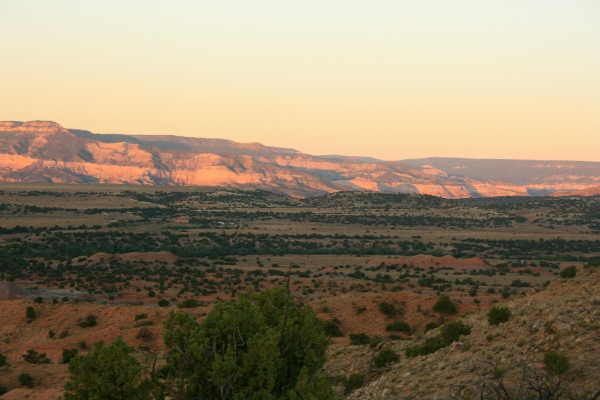
When you just don’t want to. Part deux.
At the root of all of this is a deep-seated fear of change. To put it in my new-found Buddhist terminology, my ego is gripping on to its three Lords for life. Or something like that. Another situation where the language can corrupt the meaning, but where the necessity of communication rules.
So lately I’ve noticed the following:
The more this fear of change acts up, the more I sit still and listen to the voice that freezes me in place. For example, I could spend all day at the computer looking at things. I am not proud of this, but this is what happens when you have no TV but an internet connection and you want to just waste time.
Of course I don’t consciously want to waste time. But mind and me, we’re having a bit of a battle right now. Mind is scared of change because it understands that the kind of change I’m pushing for means its complete obliteration. Or at least a new pair of shoes.
But I have got the upper hand, you see, because as much as mind can scare me into sitting still, I am still capable of movement. So when mind tells me not to practice yoga in the morning, because I could injure myself again, because my back hurts, because I am inspired to write, because I have a half-drawn rose that I want to finish, because I want to bake because there’s laundry to do because, well you get the picture. So do you know what I do? I just practice. While mind is freaking out. While it hurts, while my hips are too stiff, while all of these things are happening, I just do it. And about the time I get to marichyasana B, it shuts up. Kind of.
A good fight
So much pain; so much grief. It’s everywhere.
I’m still listening to this lecture on insulin resistance. It’s a long lecture and I have lots of notes to take. One of the things that I like about it is that he often relates the scientific studies that he quotes to hunter-gatherer societies. Now granted we can only really guess, or educated guess, what these societies were like, I still like it. Partly because it makes me nostalgic for a way of life I’ve never known, but mostly because it’s rational. If our species have been doing something for thousands of years, and it worked for us, then I am going to go with that, especially if it feels good too.
It got me thinking about stress. About stress and life and how, a few months ago when I was on a sailing trip, I was less stressed than I’d been in years. Quite possibly since I’d been out sailing last. Out at sea, completely cut off from civilisation. Phones don’t work. Computers don’t have interwebs to connect to (not that one guy on the trip didn’t try every five minutes to find a wi-fi signal… in the middle of the Pacific). You throw dinner together with what you have on hand (I insisted on cooking– I don’t trust these men with their man meals). And you hope that you don’t run out of tea before you get back. But all of these things are a combination of planning and chance; rootedness and openness.
Life slows down a bit. For long periods of time you gaze out at the horizon. Every now and then another vessel comes into sight and you get to play mariner and try to figure out the vector of its course. And then often times you realise that it’s a MASSIVE ship bringing freight boxes all the way from China and how unnaturally big it must be for you to be able to see it so clearly when it’s actually two miles away. It gets closer and is the size of a ten story building. Big things scare me. But that’s another story.
And the constant motion is so reassuring. It’s the safety in chaos. The one thing that never happens with silence or peace of static perfection because installed in it is always this seed of fear that it could and will break. But not the sea. The sea is always unpredictable. The waves keep you rolling, and the weather keeps you on your toes. So do engines, by the way, especially ones that break when you’re navigating your way into a tight cove to grab a mooring for the night. They keep you on your toes so that you have to make snap decisions (carry on and do it under sail) that could mean life or death, or at least hypothermia. And we slept. With the waves lapping the hull. With the sound of halyards tinking on masts. With the winds picking up, and the birds and the trees on the shore. In constant movement.
There comes a point, with this movement, where it gets a little overwhelming. I feel it in my liver, this fear, that it’s all just too much. It grabs on to something, anything, for dear life, and clings to it until I convince it to let go, which it does. But then the constant influx of movement is once again too much and it grabs and holds again. Release, grab, hold, relax, release. Classic liver qi stagnation. But then, along the way, there’s always a point at which I get bigger. I get bigger and I also get smaller, and all of a sudden I am a part of the change. And the smallness is both change and constant; it keeps pace like a metronome. Inhale, exhale. Lub-dub. But more than keep pace, it also watches. And then it’s all just a matter of action and breath. I don’t know any other way to describe it than that. Act and breathe. And everything else falls into place.
I wake up at 4am. The night is still dark. I crawl up onto the deck and breathe in the smells. Seaweed and salt and old boats and grasses on the shore of the island. I sit there and, since I’m alone, I start to talk to my dad. I tell him that I find it funny that I don’t want to be away from this. That for so many years I didn’t want to be like him, and was convinced that I wasn’t like him, but when he died that changed. When he died my anger went away and was replaced with a grief that was deep like the ocean, and all of a sudden I didn’t need to not be like him anymore. I want to live like this. I want to throw out almost everything that I own and have the things that I need to deal with be broken engines and halyards being set free by idiots who want wifi signals and places to hang their shorts to dry. Not standing in line at the DMV (which reminds me, I still need to do that) or dealing with parking tickets or school administrations or any of the stuff that is stressful in a baseline exhausting way. And then I say that I understand why he wanted to spend so much time out here. And why he clung to it, as a small rebellion. And the black turns to grey, and the grey turns to yellow, and I pad below deck to make coffee for the crew.
Stress. City stress. Waiting in hours of traffic to get to somewhere 8 miles away. Waiting in lines to get pieces of paper to take to other places to get stamped and put in the mail to get little certificates that say you are allowed to own a car, or drive a car, or operate heavy machinery. I can’t help but grit my teeth at the imposed order. I can’t help but tense my shoulders in response to the inhumanity of it all. But then, when you look at how we treat other animals in different species, how can we be expected to treat each other with any shred of respect either? When a life can be snuffed out without so much as a thought of the amount of energy it took to create. Or the cycle of life that it is a part of. When we consume our way through lives and resources to feed this great big hunger hole, why on earth would we want to slow down and breathe in the smog and watch the pretty sunsets that result without at least quantifying it in some way (oh but it makes me feel better, to be able to label it and put it away again, out of harms reach): beautiful, pretty, nice, cool, awesome, rad. Shhh.
So much pain. So much pain that we run as fast as we can to get away from it all.
It’s not going anywhere.
Shhhh
The other day, instead of feeding in to my usual story “I can’t do it, it’s all so scary, I could have done that better, this hurts, this hurts, this hurts” I turned around inside my own little head and said “Oh shut UP”.
And when I was finished with the lightest and strongest practice of my life (busted knee or no busted knee), I walked outside the shala and a man walking past to go to his shop, who was carrying a vase full of lilies, stopped, put them down, and gave me half. He gave me flowers, for telling myself to shut the fuck up. I should get my brain to shut up more often…
_Please pardon our mess while we’re under construction.
That’s the problem with comparisons, you know. The problem with practicing in a room full of people too. With self-practice, I do the same thing every day. Every day my leg inches a little closer to the back of my neck. Every day my fingertips edge closer to my heels. My pick ups become lighter, my jump throughs start barely scraping, and I feel like I’m doing well. And then I walk into a room full of people who have been doing this for much longer, who are much bendier, and much stronger, and have brighter eyes and fancier outfits. And all of a sudden I cannot pick up enough. And my stupid hips won’t open enough. And somebody else can get themselves into garba pidasana, and I happen to glance over and see that his leg is in a different place to mine. So I grab my leg and move it, and my knee says CRACK POP because, well, my knee isn’t supposed to go where his knee went.
I’m reading a lot about insulin resistance lately. How our brains are so used to running on glucose that when we try and make the switch to running on ketones (which, according to the few studies I’ve read, is actually an even more natural state to us humans than glucose*), our brains hate it. There’s a good 3 weeks in which you feel depressed and exhausted because your brain cannot get used to the new fuel. Most weaklings, me included, at this point start eating copious amounts of cherries to give oneself a quick glucose fix. But if you can stick it out, through the sludge, then one morning you wake up and the world is a different place. This is what I’ve read. I’m still trudging through sludge. The cherry binges get in the way a bit.
A busted knee is a huge alarm clock that rings every time you try to be something you’re not. I feel like it’s not just my brain making a switch. That my psyche, that is so used to external stimuli as a marker for progress, will never actually be satisfied with my place in the world outside of a vacum. That it’s making a switch to being driven by internal stimuli, by a pleasure-metre, and an impeccability metre, and that right now I just shudder to a halt quite a lot while I try to decide which engine to run.
*The addition of grains to the human diet, and subsequently the addition of massive doses of carbohydrate to our diet (that is, the switch from a hunter-gatherer diet, living and brain-feeding on ketones to glucose) has been documented to have happened around the same time as the right-left brain switch. Ok, I lied. There’s no documentation at all. You’ll have to follow it back yourself, too. But think about it for a minute… what came before the sugar high and the caffeine tic?
